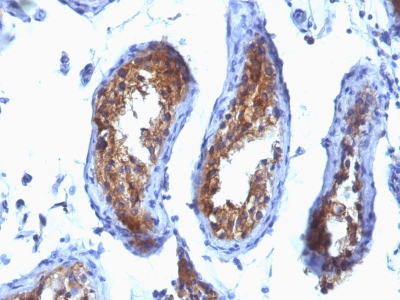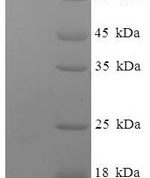Human Anti-Major Vault Protein Antibody Product Attributes
Species: Human
Tested Applications: Flow Cytometry, Immunofluorescence, Immunohistochemistry (IHC).
Application Notes: Flow Cytometry (0.5-1ug of antibody/million cells in 0.1ml), Immunofluorescence (0.5-1ug of antibody/ml), Immunohistochemistry (IHC) (Formalin-fixed) (0.5-1ug of antibody/ml for 30 minutes at RT)
Clonality: Monoclonal
Anti-Major Vault Protein Antibody Clone: SPM280
Clone SPM280 Host and Isotype: Mouse IgG1 kappa
Anti-Human Major Vault Protein Positive Control Sample: MCF-7/HeLa, breast tumors
Cellular Localization of Antibody Cytoplasmic
Buffer and Stabilizer: 10mM PBS with 0.05% BSA & 0.05% azide.
Antibody Concentration: 200ug/ml
Antibody Purification Method:Protein A/G Purified
Immunogen: Proteins precipitated from human breast cancer MCF-7 cells
Storage Conditions: Store at 2 to 8° C (refrigerate). Stable for 24 months when properly stored.
Major Vault Protein Previously Observed Antibody Staining Patterns
Observed Subcellular, Organelle Specific Staining Data:
Anti-MVP antibody staining is expected to be primarily localized to the cytosol.Observed Antibody Staining Data By Tissue Type:
Variations in Major Vault Protein antibody staining intensity in immunohistochemistry on tissue sections are present across different anatomical locations. An intense signal was observed in glandular cells in the appendix, respiratory epithelial cells in the bronchus, glandular cells in the colon, peripheral nerve/ganglion in colon, glandular cells in the duodenum, macrophages in lung, respiratory epithelial cells in the nasopharynx, glandular cells in the rectum and small intestine, Leydig cells in the testis and urothelial cells in the urinary bladder. More moderate antibody staining intensity was present in glandular cells in the appendix, respiratory epithelial cells in the bronchus, glandular cells in the colon, peripheral nerve/ganglion in colon, glandular cells in the duodenum, macrophages in lung, respiratory epithelial cells in the nasopharynx, glandular cells in the rectum and small intestine, Leydig cells in the testis and urothelial cells in the urinary bladder. Low, but measureable presence of Major Vault Protein could be seen inhematopoietic cells in the bone marrow, Purkinje cells in the cerebellum, endothelial cells in the cerebral cortex, neuropil in cerebral cortex, glandular cells in the cervix, uterine, cells in the endometrial stroma in endometrium, glandular cells in the endometrium and epididymis, neuronal cells in the hippocampus, bile duct cells in the liver, germinal center cells in the lymph node, non-germinal center cells in the lymph node, exocrine glandular cells in the pancreas, glandular cells in the parathyroid gland, salivary gland and seminal vesicle, keratinocytes in skin, fibroblasts in mesenchymal tissue, peripheral nerve in mesenchymal tissue, cells in the white pulp in spleen and squamous epithelial cells in the tonsil and vagina. We were unable to detect Major Vault Protein in other tissues. Disease states, inflammation, and other physiological changes can have a substantial impact on antibody staining patterns. These measurements were all taken in tissues deemed normal or from patients without known disease.Observed Antibody Staining Data By Tissue Disease Status:
Tissues from cancer patients, for instance, have their own distinct pattern of Major Vault Protein expression as measured by anti-Major Vault Protein antibody immunohistochemical staining. The average level of expression by tumor is summarized in the table below. The variability row represents patient to patient variability in IHC staining.| Sample Type | breast cancer | carcinoid | cervical cancer | colorectal cancer | endometrial cancer | glioma | head and neck cancer | liver cancer | lung cancer | lymphoma | melanoma | ovarian cancer | pancreatic cancer | prostate cancer | renal cancer | skin cancer | stomach cancer | testicular cancer | thyroid cancer | urothelial cancer |
|---|---|---|---|---|---|---|---|---|---|---|---|---|---|---|---|---|---|---|---|---|
| Signal Intensity | ++ | - | + | ++ | ++ | - | ++ | ++ | - | + | + | + | ++ | - | ++ | - | ++ | - | ++ | + |
| MVP Variability | ++ | ++ | ++ | ++ | ++ | ++ | +++ | ++ | ++ | ++ | ++ | ++ | + | + | + | + | ++ | ++ | ++ | ++ |
Limitations and Warranty
enQuire Bio's Major Vault Protein Anti-Human Monoclonal is available for Research Use Only. This antibody is guaranteed to work for a period of two years when properly stored.

.jpg)



-178x178.jpg)
-178x178.jpg)

There are no reviews yet.